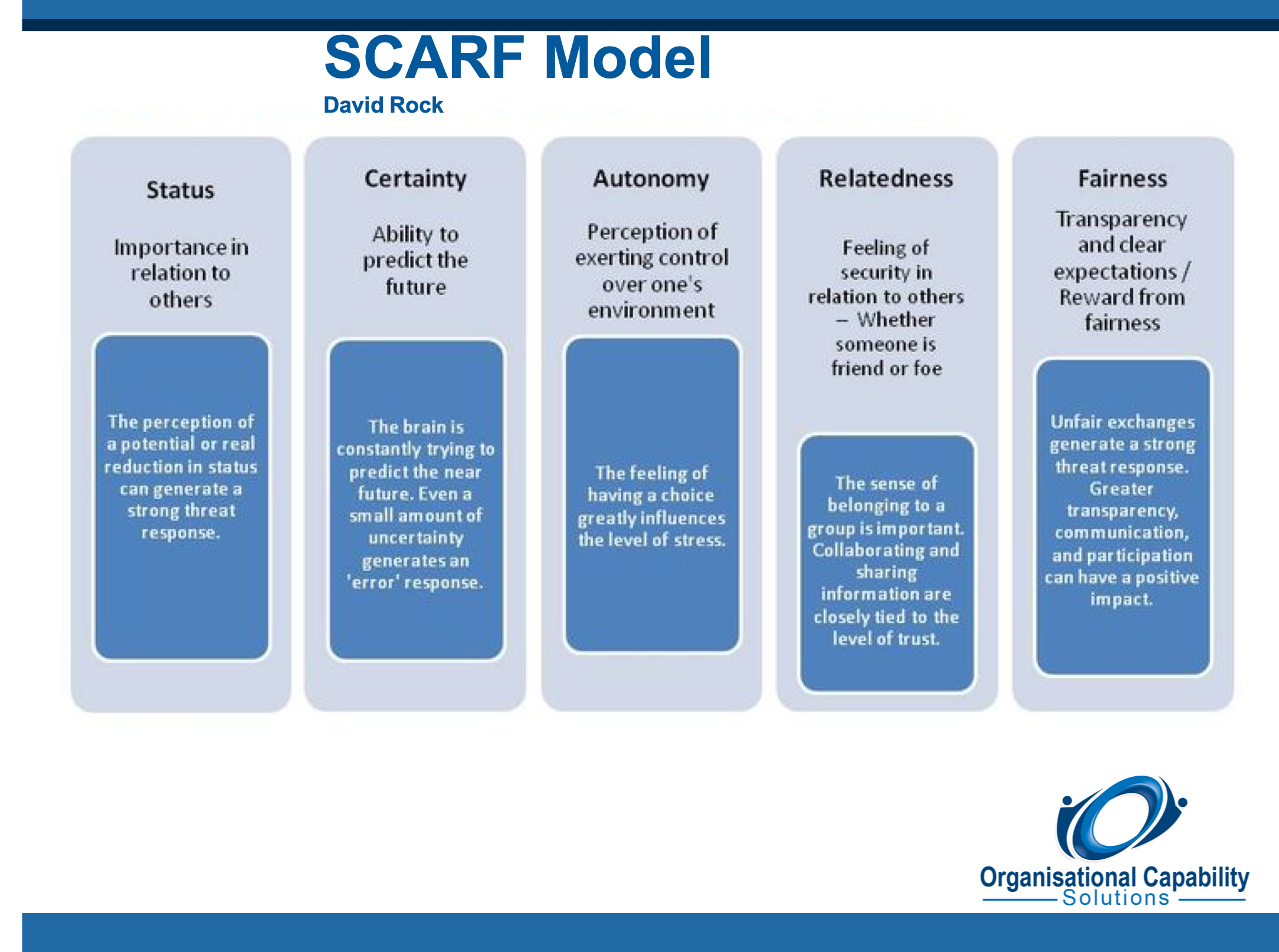Leading in Uncertain Times - COVID-19. #1
/To assist you our clients, I wanted to provide tools that will assist you to get on with the work of leading your people in these even more than usual, of uncertain times. Over the coming days, I will provide concepts that I hope you find useful in fulfilling your leadership roles.
Many of you will have learnt a number of the concepts before. These emails are intended to bring the concepts back to the front-of-mind, and deliver them in the context of the uncertainty we are all experiencing now.
I hope the 'bite-size' format of delivery makes their consumption practicable.
Keep yourselves and your people well.
Gordon Brockway
Founder
Concept 1 - David Rock's SCARF Model.
Using David Rock's SCARF Model, here are some suggestions to assist your organisation lead more effectively through any current uncertainty.
Status:
Assure people of their status wherever and whenever you can. In most cases their status will not diminish. In some cases, their status will increase, such as health workers.
My current thinking is that the people at risk are casual workers who are likely to be the first to have their hours reduced or even have no work offered. What can you do to assure their status? Can you promise to call them first when the work resumes. Is there any work you can have done by them that will help you prepare for the upswing when this is over. And if the schools are closed for a time, how do you maintain the status of the people who will need time off to care for our children. Use of leave certainly, and you can take the lead in ensuring they are not criticised in any way for being a parent. Can you be more creative in job share, part-time and working from home arrangements, so people can meet their vital parent obligations and still support your business.
Certainty
Again for many, longer-term work can be assured. Most of our organisations will exist at the end of this disruption, and most of your people will have a job, the same job, at the end of it.
Those taking time off to care for others can be given certainty if you choose to. Some industries will shrink or even close for a time. What certainty can you give them when reopening occurs? People who lose income due to closures may have other uncertainties in their lives such as meeting mortgage and other credit responsibilities. You can assist your people by directing them to relevant government agencies (centrelink) and encourage them to talk to their credit providers about making arrangements to obtain adjustments to their repayments during this period.
Ensure you have optimal infection control plans in place and they are being implemented.
Utilise technology to minimise the need for direct personal interaction.
Remind people that this period will pass, we don't know when, but it will pass.
Autonomy
Some suggestions from me here are:
Where practicable give as much choice as you can about work arrangements such as part time, work from home and job sharing.
Provide people with quality information on Covid-19 and appropriate infection control. Then ensure you provide people with the tools and materials to apply such measures. Enforce minimum standards, but allow people to take extra steps if that gives them comfort.
To increase the physical space between people, can you create more space for people to work. Utilise the spaces created by people working from home, Utilise meeting rooms as work spaces, open up any closed down work areas.
Involve your people in making suggestions and developing suitable responses.
Relatedness
This is about optimising the level of a sense of belonging to a group. Challenging when the response to such a virus is to minimise personal interaction. My suggestions here are:
Increase the internal communication about the organisation's actions in relation to COVID-19.
Where your organisation has a direct role in addressing the virus, proudly explain how the work of your organisation is helping others.
Ensure that communication includes quality information on how the people (staff, customers, others) are being cared for by your organisation.
Provide updates on anyone who has been impacted by the illness (with their permission of course).
Continue to celebrate personal milestones, just do it with less close personal contact.
In communications, include staff who are on leave and casuals who's services are not being utilised for now.
With handshakes now deemed unhealthy, create new ways to do personal greetings. You can have some fun with this. I am personally promoting the 'elbow bump', the'air high-five', also known as the 'wi-five' and, the 'foot tap'.
Create opportunities to share resources, both for work as-well-as those required at home.
As leaders, take time to be seen (hygienically) around your organisation. This may include VC'ing into meetings.
Fairness
Extra care is required to ensure that your responses are not only fair, but seen to be fair. So your executive team can work from home and be relatively safe. What are the options for your frontline people? How will you keep them safe? And equally importantly ensure everyone knows you have kept them safe.
What resources are being allocated to ensure their safety and well-being?
If you are moving into the space of having to reduce staff numbers, what are you doing to ensure equity in how those decisions are taken.
You may choose to take a 'we are all in this together approach'. While cashflow will be a major issue for many organisations, can you share the income loss around by:
Reducing hours more uniformly, e.g. moving to a shorter work week.
Having higher earning employees (probably like you) reducing your salary for a time. This may or may not be paid back at a point in the future.
Utilising leave accruals. This doesn't save cash now but it does reduce a liability.
Leadership is Real Work
All of the above takes leadership. Leadership in this context is going to mean engagement, listening, thoughtful responses, continual and quality communications with; your staff, your customers and other stakeholders. So this is not a time to expect your leaders to be extra resources for the frontline. Your leaders need to do the work of leading and managing. In addition to the higher demands on your leadership work, their will be extra demands on the management work of planning, organising, controlling, developing, motivating and staffing. This is the work that will leverage the effectiveness of your frontline people. So I urge you to consider the resourcing levels for the leadership and management work just as seriously as you would for the frontline work.


